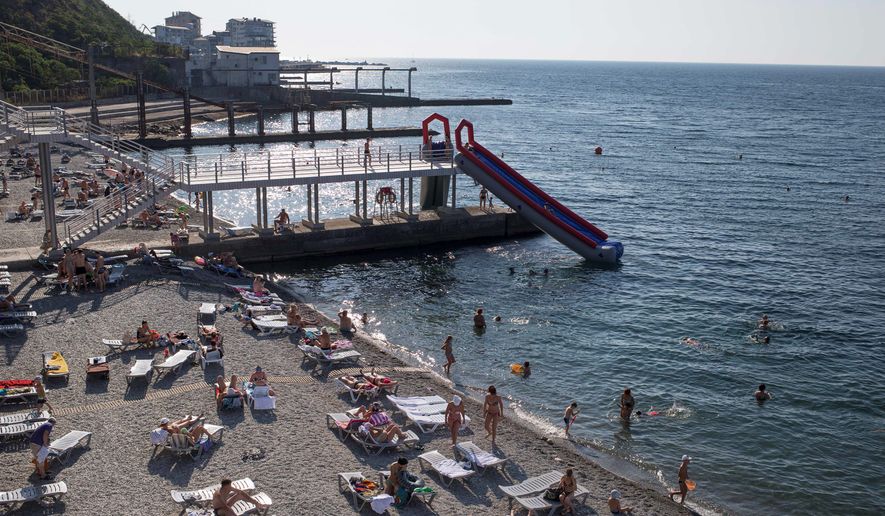KERCH, Crimea — International cruise lines have stopped docking at Yalta, and Ukrainians have boycotted the peninsula’s once-popular Black Sea beaches. But ferry dockworker Andrey Shpachenko has been doing well despite the poor tourist season.
His earnings at the company that ferries passengers to and from Crimea and Russia have more than doubled to $550 per month thanks to Russian President Vladimir Putin.
“Things are good now,” Mr. Shpachenko, 54, said while proudly washing his old Russian-made car outside his house near the ferry terminal.
Mr. Shpachenko is among the Crimeans who have benefited from Russia’s newly established rule.
One of Mr. Putin’s first moves after the March referendum that Moscow used as a fig leaf for annexing Crimea was to raise wages for workers in government-funded services — including public transportation like ferries — to make them equivalent to those in Russia.
Like many middle-aged Russian-speaking Crimeans who are often nostalgic for the days of communism, Mr. Shpachenko was happy that he changed his citizenship too.
SEE ALSO: Ukraine accuses Russia of ‘direct invasion’ using aid convoy
“It’s like the Soviet Union once again,” he said happily. “I can go to Russia with no border control.”
But Mr. Shpachenko’s good fortunes and enthusiasm aren’t necessarily shared throughout the Crimean Peninsula.
Consider tourism.
Ukrainians once composed the largest tourist demographic in Crimea. Of Crimea’s 5.9 million tourists last year, Ukrainians accounted for 3 million of them. This summer only about 300,000 tourists have visited the peninsula, as many refuse to visit the region claimed by Russia, according to the Tourism Ministry of Crimea.
So far in 2014, about 2 million tourists have visited the region, though those statistics don’t include the last few weeks of August, according to tourism officials. Around 80 percent of those visitors have been Russian.
“The season failed this year,” says Gleb Yakushin, deputy head of Russian Community, a humanitarian nongovernmental organization based in Sevastopol, Crimea’s biggest city. “The number of people who came is nothing compared to previous years.”
SEE ALSO: Putin’s nuclear navy gets an upgrade: Russia christens new top-secret submarine
Moscow has been encouraging Russians to vacation in the region. But, like much of Russia’s support of the peninsula, the results of Moscow’s help have been mixed. The same Russian officials seeking to boost Crimean tourism have done little to support transportation links to the region.
Aeroflot Russian Airlines unsuccessfully attempted to create a budget airline connecting Moscow to Simferopol, the provincial capital. The company collapsed after two months, blaming EU sanctions against Russia for its failure to launch.
The most popular way to get from Russia to Crimea is by train. The railway stations in Simferopol and Sevastopol still receive several arrivals from Russia, but the route goes through Ukraine and takes more than 24 hours.
Tourism is not the only part of the Crimean economy suffering since the annexation. The financial sector of Crimea also took a hit this year. Following Russia’s takeover, Ukrainian banks stopped conducting business there. The country’s largest bank, PrivatBank, closed some 300 offices on the peninsula.
Moscow’s subsidies are mitigating the drop-off in economic activity. But five months after the referendum, pay raises and inflated pensions are among the few improvements in the Crimean economy. And they affect only about 40 percent of Crimea’s 1.9 million people, according to figures released by Russian officials.
Russian rule also hasn’t fixed problems that have been long neglected.
“Our village has lived without a water supply for God knows how many years now,” said Mr. Shpachenko. “Someone stole the pipe. I hope we’ll finally have money to buy a new one.”
Mr. Putin aims to address such problems by investing $18 billion in economic development in the peninsula. Despite the anticipated economic lifeline, however, some locals are skeptical of his promises.
Mr. Yakushin oversaw a local board of elections during the March referendum and remembers how Crimeans were hopeful about a better future with Russia.
“The referendum was a spoof,” he said, admitting the vote was bogus even though he was pro-Russian. “But it is true that people eagerly voted for Russia. In some 3,000 bulletins, I only saw 15 votes for Ukraine.”
After the disappointment of a failed tourist season, however, his faith in Russia has waned.
“There is still hope that life will improve,” he said. “But in reality, nothing has changed yet.”




Please read our comment policy before commenting.